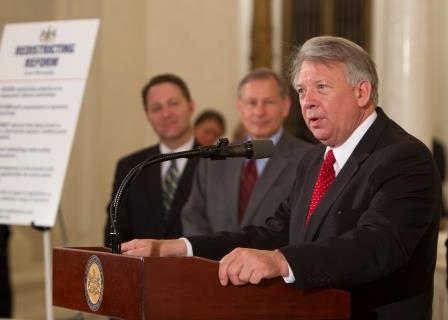HARRISBURG – Reforming the legislative and congressional redistricting process so that citizen input, not political influence, is used to craft fair and equitable districts is essential, state Sen. John N. Wozniak (D-Cambria/Bedford/Clearfield) said Wednesday, as he stood with reform advocates at a news conference at the state Capitol.
“A non-political citizens’ commission that relies on fair-mindedness and not political influences is critical to developing meaningful reforms of the redistricting process,” Wozniak said. “When districts are redrawn to benefit political parties, they are skewed, distorted and end up discouraging citizen participation.”
Wozniak spoke following a news conference held by a bipartisan group of lawmakers who defined seven core principles associated with redistricting reform. These principles include:
- Redistricting by an independent citizens commission;
- Reforming both congressional and legislative redistricting;
- Prohibiting districts from being drawn to favor or discriminate against a political party or candidate;
- Utilizing sound methodology when setting district boundaries;
- Transparency in the process with opportunities for public participation;
- Districts drawn as equal in population as possible with a minimum range of deviation;
- Political subdivisions and communities of interest respected.
Frustrated by the process that originally produced a redrawn legislative map that was rejected by the state Supreme Court and a subsequent map filled with contorted districts to favor political parties, a legislative workgroup of both Republicans and Democrats was formed to reform the process, according to a press release from Wozniak’s office.
“Our citizens need to be assured that their voice will be heard and they will be represented well by their elected representatives in compact, contiguous and non-gerrymandered districts,” Wozniak said. “I support a fair and balanced process spearheaded by an independent citizens’ commission that which is immune from political influence.”
Currently, legislative maps are drawn by a constitutionally-mandated Legislative Reapportionment Commission. The commission includes either the political leaders of the General Assembly or their appointees and a fifth member who is either agreed-to by the commission members or is appointed by the Supreme Court.
For a new reapportionment process to be in place prior to the next redistricting following the 2020 census, legislation establishing a citizen’s commission must be approved twice by the General Assembly and approved in a voter referendum.



